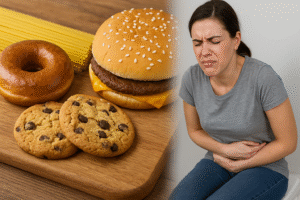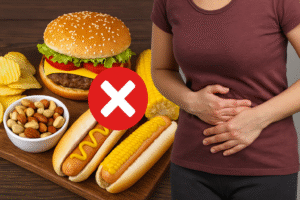Diverticulitis occurs when small pouches in the colon (diverticula) become infected or inflamed. The pouches can occur when weak spots in the colon wall protrude because of pressure, frequently from constipation or straining. While diverticulosis — the presence of these pouches — is completely symptomless, diverticulitis can cause abdominal pain, fever, nausea, and digestive distress.
The key to effectively controlling diverticulitis is making wise food choices. Some foods can exacerbate symptoms or even spur flare-ups by irritating the digestive tract, boosting pressure in the colon, or obstructing it. Knowing the foods to avoid with diverticulitis can help reduce these risks significantly.
In this article we’ll cover 7 foods to avoid with diverticulitis, why you may want to avoid them, and some other good food choices you can make in the meantime. Whether you’re in the process of recovering from a flare-up or are living with the condition long term, consider these tips to help support better gut health.
1. Nuts and Seeds (During an Acute Flare)

Why Avoid It:
Although in the past, nut and seed consumption has been advised against for the prevention of diverticulitis, recent studies have shed some doubt on this association, but many doctors still encourage patients to give them up during acute attacks. Hard particles can become lodged in diverticula and traumatize inflamed spontaneously fractured tissue, although the latter remains controversial.
Examples to Avoid:
- Almonds, peanuts, walnuts
- Sunflower seeds, pepitas
- Chia and flax seeds
Better Alternatives:
- Nut butters (peanut butter, smooth)
- Fruit with the seeds removed or juice strained smooth
- Tender boiled vegetables for mild fiber
2. Popcorn

Why Avoid It:
This is because it contains indigestible hulls. After being processed in the colon, these hulls can cause irritation. Mechanical irritation can be caused by diverticulitis there, so best avoided during flares. It’s one of the more common foods to avoid with diverticulitis, especially during active symptoms.
Examples to Avoid:
- Buttery movie-theater popcorn
- Seasoned microwave popcorn
- Kettle corn
Better Alternatives:
- Soft rice cakes
- Plain mashed potatoes
- Cooked oatmeal
3. Red Meat

Why Avoid It:
High red meat diets have been associated with an increased risk of developing diverticulitis. Red meat takes longer to digest, can lead to inflammation and even constipation, adding even more pressure on the walls of the colon. Among the most advised foods to avoid with diverticulitis, red meat ranks high.
Examples to Avoid:
- Beef steak, ribs, or burgers
- Pork chops or sausages
- Processed deli meats
Better Alternatives:
- Skinless poultry (such as turkey or chicken)
- Alternative proteins (lentils, tofu – if well-tolerated)
- Fish such as salmon, cod or tilapia
4. Refined Grains
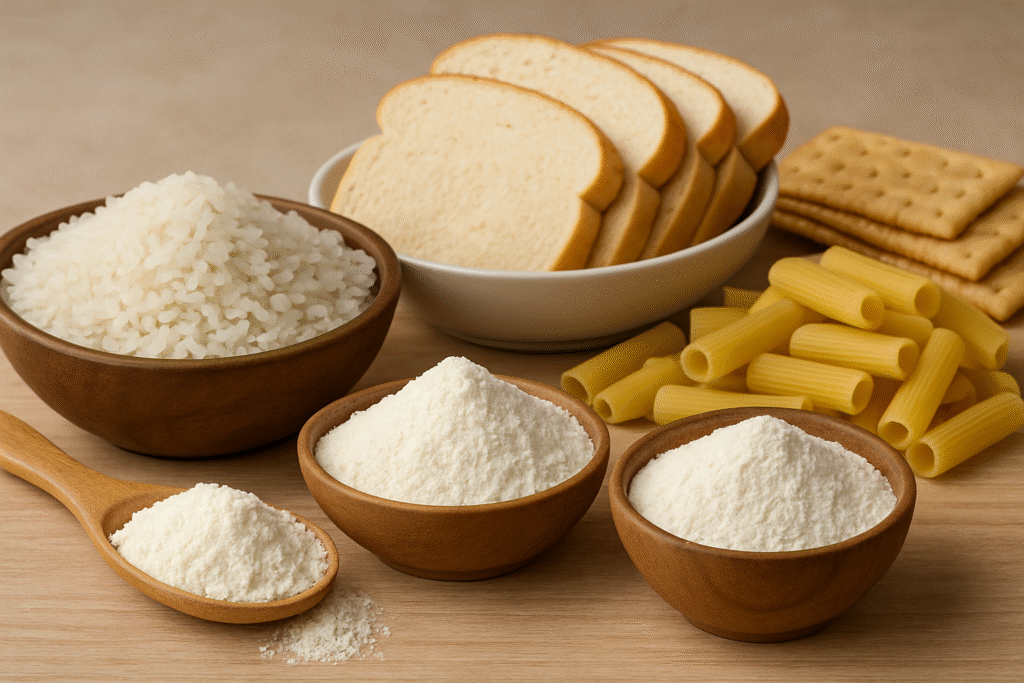
Why Avoid It:
Refined grains are also devoid of fiber, which aids in digestion and can reduce your risk of constipation, a common cause of diverticulitis. Fiber is necessary to keep the stool soft and the colon working properly. For those with this condition, refined grains are key foods to avoid with diverticulitis.
Examples to Avoid:
- White bread
- Regular pasta
- White rice and sugary cereals
Better Alternatives:
- Bread made with whole grains (if in remission)
- Brown rice or quinoa
- Oats and barley
5. High-Fat Dairy Products
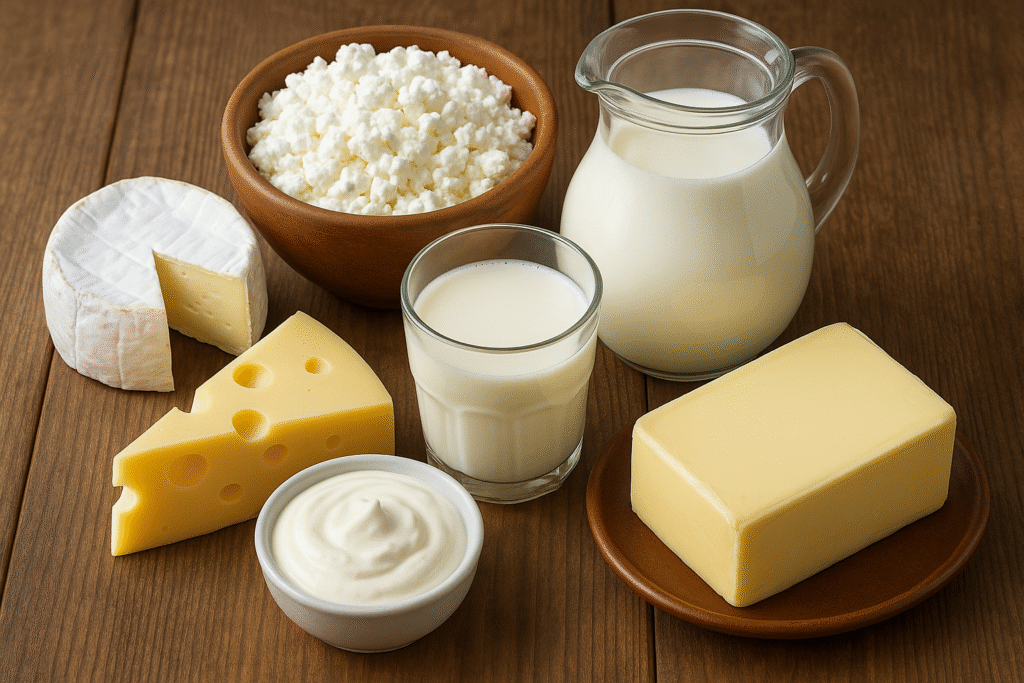
Why Avoid It:
Full-fat dairy is often difficult to digest and can cause bloating and inflammation. Those with diverticulitis often note that high-fat or spicy foods exacerbate symptoms. It’s another category of foods to avoid with diverticulitis, especially for sensitive digestive systems.
Examples to Avoid:
- Whole milk
- Soft cheeses such as brie or cheddar
- Ice cream or whipped cream
Better Alternatives:
- Low-fat or lactose-free milk
- Greek yogurt (plain, non-fat)
- Dairy-free substitutes such as almond or oat milk
6. Fried and Greasy Foods
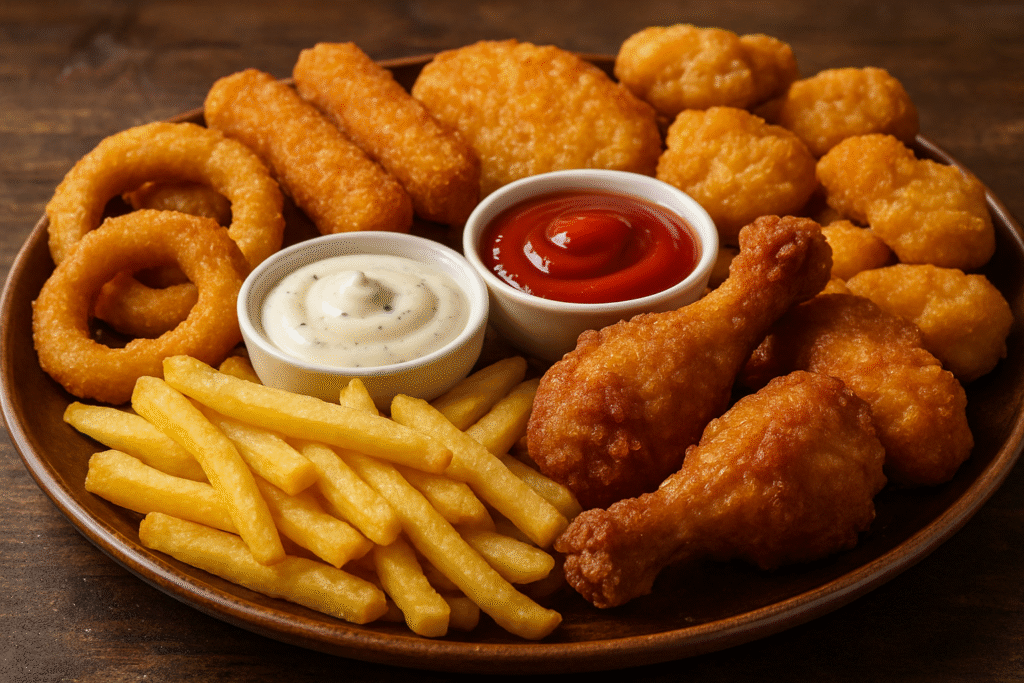
Why Avoid It:
All that fried food is bound to sit in your stomach for hours and hours, which isn’t good when you’re in an active flare and your digestion is already sluggish. They are also inflammatory to the gut and can lead to cramping and diarrhea. These are significant foods to avoid with diverticulitis during flare-ups.
Examples to Avoid:
- French fries
- Fried chicken or fish
- Doughnuts and pastries
Better Alternatives:
- Baked or grilled lean meats
- Steamed vegetables
- Roasted sweet potatoes
7. Spicy Foods
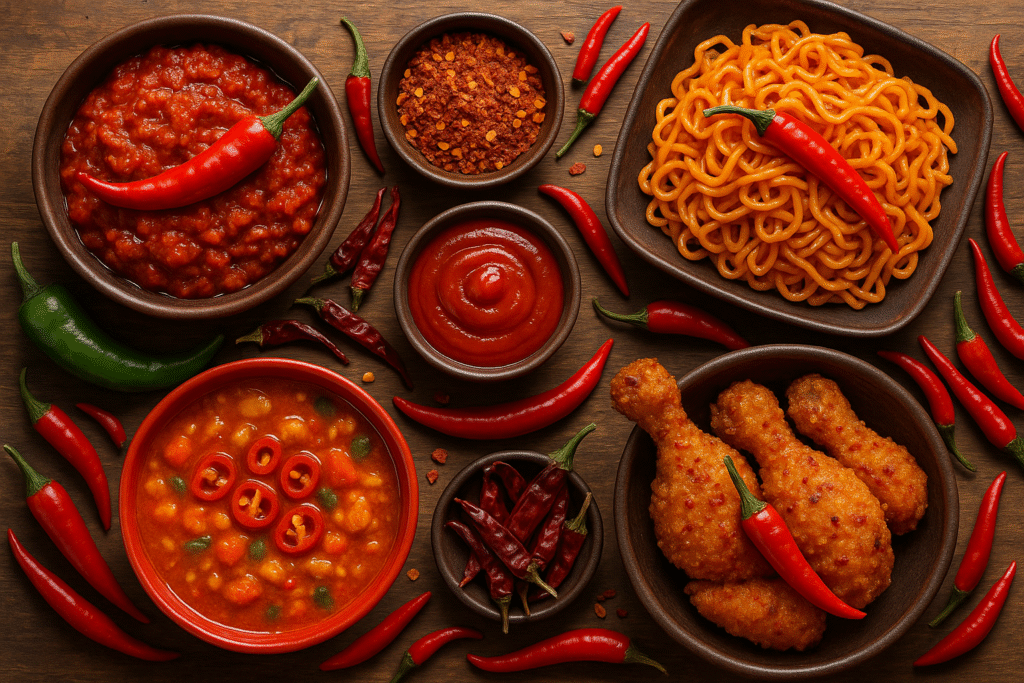
Why Avoid It:
Hot, spicy foods may be annoying to the gut lining and can even at times exacerbate abdominal pain in people who are experiencing a bout of diverticulitis. Chili peppers, home to a heat-generating compound called capsaicin, could irritate the digestive system. These are classic foods to avoid with diverticulitis, especially during active episodes.
Examples to Avoid:
- Hot sauce or salsas
- Spicy curries
- Jalapeños, chili flakes
Better Alternatives:
- Lightly flavoured herbs such as parsley or basil
- Lemon juice for flavor
- Low-sodium broths
What to Eat During a Flare-Up
When you have an attack of diverticulitis, your digestive system needs to take a break. Clear liquid diet: This is normally followed for 1-2 days, then slowly transitioning to a low-fiber, soft-food diet as symptoms subside.
Safe foods include:
- Clear broth or gelatin
- Applesauce or mashed bananas
- White rice or plain pasta
- Carrots or potatoes – cooked, peeled
- Plain scrambled eggs
After the symptoms disappear, gradually add fiber-containing foods under medical supervision. Avoiding common foods to avoid with diverticulitis during this phase is essential for healing.
When to Talk to a Doctor
If you’re experiencing:
- Abdominal pain that doesn’t go away or gets worse
- Chronic constipation or diarrhea
- Fever, chills, or nausea
- Blood in your stool
… consult a healthcare provider promptly. Recurrent cases may require more advanced treatment, and a doctor can guide you in identifying long-term foods to avoid with diverticulitis.
FAQs About Foods to Avoid with Diverticulitis
Can I ever eat nuts and seeds if I have diverticulitis?
Yes, most patients can reintroduce them once the condition is stable. But they are among the foods to avoid with diverticulitis during an active flare.
Do probiotics help with diverticulitis?
Probiotics might support digestion, but consult your doctor. They aren’t a cure for diverticulitis, nor do they replace avoiding problematic foods.
What not to drink if you have diverticulitis?
Avoid alcohol, caffeine, and sugary sodas during flares. Choose water, herbal teas, and broths instead—much like choosing foods to avoid with diverticulitis, drinks matter too.
Does fiber help or harm diverticulitis?
Fiber helps prevent flares, but when the disease is active, low-fiber diets are best. It’s about timing your intake while steering clear of the foods to avoid with diverticulitis during acute stages.
Is it possible for diverticulitis to go away on its own?
Mild cases may improve with rest, dietary changes, and antibiotics. But avoid assuming it will pass—especially if you’re not avoiding the typical foods to avoid with diverticulitis.
Final Thoughts
To manage diverticulitis, begin by knowing what foods affect your gut. You can reduce your risk of pain and complications during flare-ups by avoiding common triggers such as nuts, red meat and greasy foods. The trick is eating a mild, well-rounded diet and making gradual changes under medical guidance.
These 7 foods to avoid with diverticulitis are a good start—but everyone’s gut is different. Listen to your body, consult your doctor, and let your nutrition choices support your healing.

